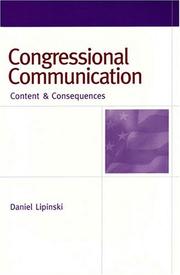| Listing 1 - 10 of 26 | << page >> |
Sort by
|
Book
Year: 2018 Publisher: Washington : U.S. Government Publishing Office,
Abstract | Keywords | Export | Availability | Bookmark
 Loading...
Loading...Choose an application
- Reference Manager
- EndNote
- RefWorks (Direct export to RefWorks)
United States. --- Rules and practice. --- Constituent communication.
Year: 2019 Publisher: [Washington, D.C.] : Congressional Research Service,
Abstract | Keywords | Export | Availability | Bookmark
 Loading...
Loading...Choose an application
- Reference Manager
- EndNote
- RefWorks (Direct export to RefWorks)
Social media --- United States. --- Constituent communication.

ISBN: 1282444557 9786612444555 0472023748 9780472023745 0472030191 9780472030194 Year: 2004 Publisher: Ann Arbor : University of Michigan Press,
Abstract | Keywords | Export | Availability | Bookmark
 Loading...
Loading...Choose an application
- Reference Manager
- EndNote
- RefWorks (Direct export to RefWorks)
Communication in politics --- United States. --- Constituent communication.
Book
Year: 2019 Publisher: [Washington, D.C.] : [U.S. Government Publishing Office],
Abstract | Keywords | Export | Availability | Bookmark
 Loading...
Loading...Choose an application
- Reference Manager
- EndNote
- RefWorks (Direct export to RefWorks)
Consent (Law) --- United States. --- Constituent communication.
Book
ISBN: 9780472220427 Year: 2022 Publisher: Ann Arbor, Michigan : University of Michigan Press,
Abstract | Keywords | Export | Availability | Bookmark
 Loading...
Loading...Choose an application
- Reference Manager
- EndNote
- RefWorks (Direct export to RefWorks)
Although partisan polarization gets much of the attention in political science scholarship about Congress, members of Congress represent diverse communities around the country. Home Field Advantage demonstrates the importance of this understudied element of American congressional elections and representation in the modern era: the local, place-based roots that members of Congress have in their home districts. Charles Hunt argues that legislators' local roots in their district have a significant and independent impact on their campaigns, election outcomes, and more broadly on the relationship between members of the U.S. House of Representatives and their constituents. Drawing on original data, his research reveals that there is considerable variation in election outcomes, performance relative to presidential candidates, campaign spending, and constituent communication styles that are not fully explained by partisanship, incumbency, or other well-established theories of American political representation. Rather, many of these differences are the result of the depth of a legislator's local roots in their district that predate their time in Congress. Hunt lays out a detailed "Theory of Local Roots" and their influence in congressional representation, demonstrating this influence empirically using multiple original measures of local roots over a full cross-section of legislators and a significant period of time.
Representative government and representation --- Elections --- United States. --- Elections. --- Constituent communication.
Book
Year: 2019 Publisher: Washington : U.S. Government Publishing Office,
Abstract | Keywords | Export | Availability | Bookmark
 Loading...
Loading...Choose an application
- Reference Manager
- EndNote
- RefWorks (Direct export to RefWorks)
Consent (Law) --- United States. --- United States. --- Constituent communication. --- United States.
Book
ISBN: 9780521765404 9780511779404 9781107677005 9780511910005 0511910002 0521765404 9780511907203 0511907206 0511779402 1107677009 0511851561 1107217415 1282770896 9786612770890 051190925X 0511905920 0511908504 Year: 2010 Publisher: Cambridge New York Cambridge University Press
Abstract | Keywords | Export | Availability | Bookmark
 Loading...
Loading...Choose an application
- Reference Manager
- EndNote
- RefWorks (Direct export to RefWorks)
Congressional representation requires that legislators be aware of the interests of constituents in their districts and behave in ways that reflect the wishes of their constituents. But of the many constituents in their districts, who do legislators in Washington actually see, and who goes unseen? Moreover, how do these perceptions of constituents shape legislative behavior? This book answers these fundamental questions by developing a theory of legislative perception that leverages insights from cognitive psychology. Legislators are shown to see only a few constituents in their district on a given policy, namely those who donate to their campaigns and contact the legislative office, and fail to see many other relevant constituents. Legislators are also subsequently more likely to act on behalf of the constituents they see, while important constituents not seen by legislators are rarely represented in the policymaking process.
Book
Year: 2003
Abstract | Keywords | Export | Availability | Bookmark
 Loading...
Loading...Choose an application
- Reference Manager
- EndNote
- RefWorks (Direct export to RefWorks)
Electronic mail messages --- Government policy --- United States. --- Constituent communication. --- United States --- Internet --- Political science --- Law
Year: 2020 Publisher: [Washington, D.C.] : Congressional Research Service,
Abstract | Keywords | Export | Availability | Bookmark
 Loading...
Loading...Choose an application
- Reference Manager
- EndNote
- RefWorks (Direct export to RefWorks)
Social media --- Communication in politics --- Political aspects --- United States. --- Constituent communication.
Book
ISBN: 1621007936 9781621007937 9781621007470 1621007472 Year: 2012 Publisher: New York
Abstract | Keywords | Export | Availability | Bookmark
 Loading...
Loading...Choose an application
- Reference Manager
- EndNote
- RefWorks (Direct export to RefWorks)
Administrative agencies --- Electronic government information --- Information technology --- Management. --- Management --- Technological innovations. --- United States. --- Constituent communication
| Listing 1 - 10 of 26 | << page >> |
Sort by
|

 Search
Search Feedback
Feedback About UniCat
About UniCat  Help
Help News
News